Marco Antonio Stranisci
The World Literature Knowledge Graph
Jul 31, 2023



Abstract:Digital media have enabled the access to unprecedented literary knowledge. Authors, readers, and scholars are now able to discover and share an increasing amount of information about books and their authors. However, these sources of knowledge are fragmented and do not adequately represent non-Western writers and their works. In this paper we present The World Literature Knowledge Graph, a semantic resource containing 194,346 writers and 965,210 works, specifically designed for exploring facts about literary works and authors from different parts of the world. The knowledge graph integrates information about the reception of literary works gathered from 3 different communities of readers, aligned according to a single semantic model. The resource is accessible through an online visualization platform, which can be found at the following URL: https://literaturegraph.di.unito.it/. This platform has been rigorously tested and validated by $3$ distinct categories of experts who have found it to be highly beneficial for their respective work domains. These categories include teachers, researchers in the humanities, and professionals in the publishing industry. The feedback received from these experts confirms that they can effectively utilize the platform to enhance their work processes and achieve valuable outcomes.
Wikibio: a Semantic Resource for the Intersectional Analysis of Biographical Events
Jun 15, 2023Abstract:Biographical event detection is a relevant task for the exploration and comparison of the ways in which people's lives are told and represented. In this sense, it may support several applications in digital humanities and in works aimed at exploring bias about minoritized groups. Despite that, there are no corpora and models specifically designed for this task. In this paper we fill this gap by presenting a new corpus annotated for biographical event detection. The corpus, which includes 20 Wikipedia biographies, was compared with five existing corpora to train a model for the biographical event detection task. The model was able to detect all mentions of the target-entity in a biography with an F-score of 0.808 and the entity-related events with an F-score of 0.859. Finally, the model was used for performing an analysis of biases about women and non-Western people in Wikipedia biographies.
The URW-KG: a Resource for Tackling the Underrepresentation of non-Western Writers
Dec 21, 2022
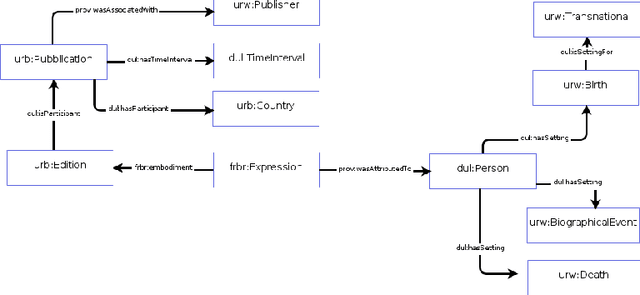
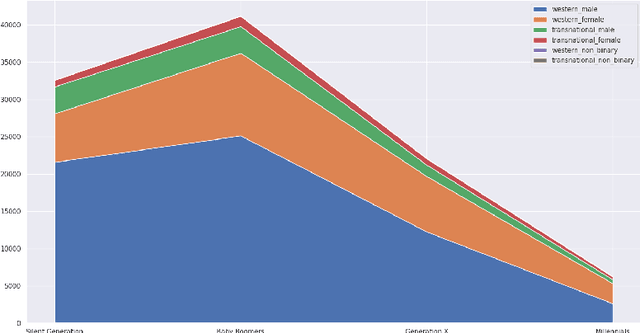
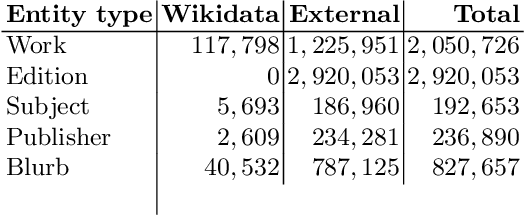
Abstract:Digital media have enabled the access to unprecedented literary knowledge. Authors, readers, and scholars are now able to discover and share an increasing amount of information about books and their authors. Notwithstanding, digital archives are still unbalanced: writers from non-Western countries are less represented, and such a condition leads to the perpetration of old forms of discrimination. In this paper, we present the Under-Represented Writers Knowledge Graph (URW-KG), a resource designed to explore and possibly amend this lack of representation by gathering and mapping information about works and authors from Wikidata and three other sources: Open Library, Goodreads, and Google Books. The experiments based on KG embeddings showed that the integrated information encoded in the graph allows scholars and users to be more easily exposed to non-Western literary works and authors with respect to Wikidata alone. This opens to the development of fairer and effective tools for author discovery and exploration.
Guidelines and a Corpus for Extracting Biographical Events
Jun 07, 2022
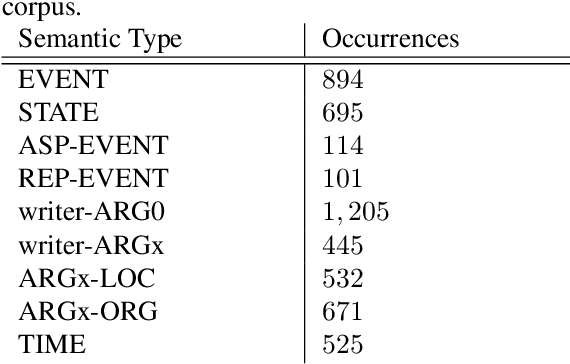
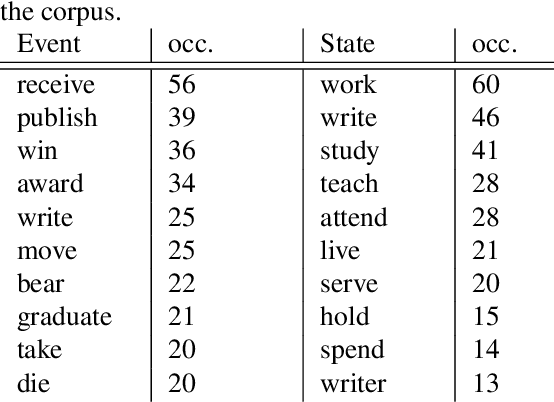
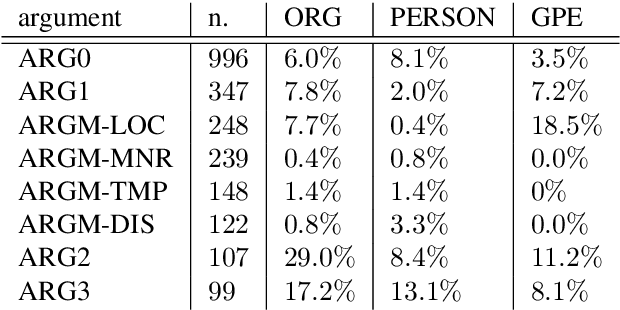
Abstract:Despite biographies are widely spread within the Semantic Web, resources and approaches to automatically extract biographical events are limited. Such limitation reduces the amount of structured, machine-readable biographical information, especially about people belonging to underrepresented groups. Our work challenges this limitation by providing a set of guidelines for the semantic annotation of life events. The guidelines are designed to be interoperable with existing ISO-standards for semantic annotation: ISO-TimeML (ISO-24617-1), and SemAF (ISO-24617-4). Guidelines were tested through an annotation task of Wikipedia biographies of underrepresented writers, namely authors born in non-Western countries, migrants, or belonging to ethnic minorities. 1,000 sentences were annotated by 4 annotators with an average Inter-Annotator Agreement of 0.825. The resulting corpus was mapped on OntoNotes. Such mapping allowed to to expand our corpus, showing that already existing resources may be exploited for the biographical event extraction task.
APPReddit: a Corpus of Reddit Posts Annotated for Appraisal
May 31, 2022
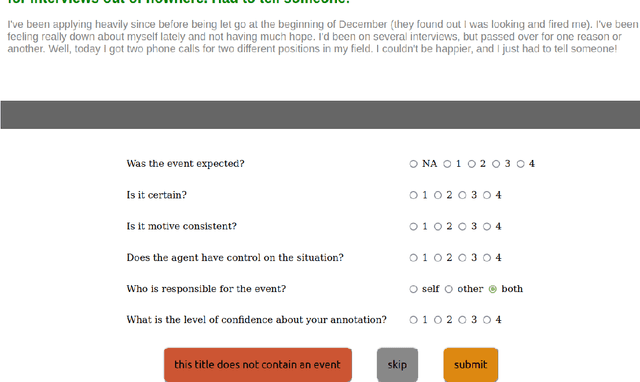
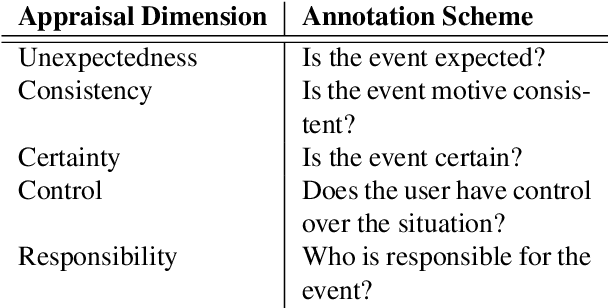
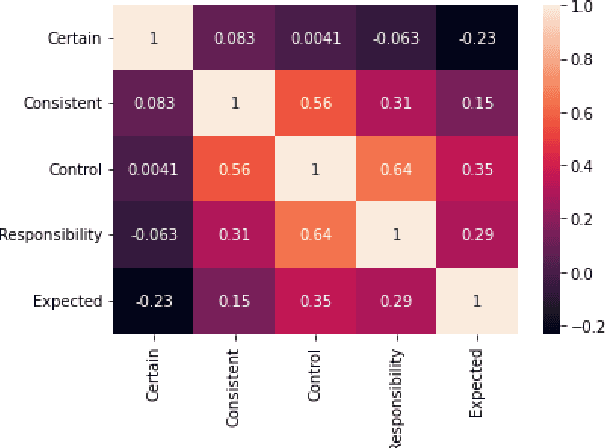
Abstract:Despite the large number of computational resources for emotion recognition, there is a lack of data sets relying on appraisal models. According to Appraisal theories, emotions are the outcome of a multi-dimensional evaluation of events. In this paper, we present APPReddit, the first corpus of non-experimental data annotated according to this theory. After describing its development, we compare our resource with enISEAR, a corpus of events created in an experimental setting and annotated for appraisal. Results show that the two corpora can be mapped notwithstanding different typologies of data and annotations schemes. A SVM model trained on APPReddit predicts four appraisal dimensions without significant loss. Merging both corpora in a single training set increases the prediction of 3 out of 4 dimensions. Such findings pave the way to a better performing classification model for appraisal prediction.
 Add to Chrome
Add to Chrome Add to Firefox
Add to Firefox Add to Edge
Add to Edge